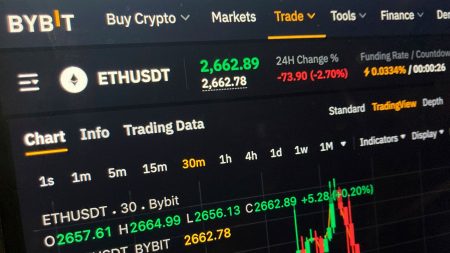Bain Capital Makes a Move: The Potential Takeover of Chemring
In recent weeks, the global private equity giant Bain Capital has made an approach to acquire Chemring, a prominent FTSE 250 defence and aerospace group. This move marks the latest in a series of takeover bids targeting London-listed companies, a trend that has gained momentum in recent months. According to sources close to the situation, Bain Capital has submitted at least one proposal to purchase Chemring, with an initial offer reportedly valuing the company at 390p per share—a modest premium to the stock’s price of 356p on Monday morning. However, it remains unclear whether a second, potentially improved offer is in the works or has already been presented to Chemring’s board, which is led by Chairman Tony Wood, a seasoned executive with a background at Meggitt and Rolls-Royce Holdings.
Chemring’s Strategic Importance in Defence and Aerospace
Chemring is a key player in the defence and aerospace industries, manufacturing high-tech products and providing critical services to organisations such as NASA and Elon Musk’s SpaceX. The company specialises in advanced technologies, including infrared countermeasure systems designed to repel enemy attacks. With approximately 2,700 employees globally, Chemring plays a vital role in supporting defence and aerospace operations worldwide. Its expertise spans a range of areas, from military defence systems to space exploration, positioning it as a critical supplier to some of the world’s most advanced programmes.
Despite its strategic importance, Chemring has faced challenges in recent months. The company’s shares experienced a sharp decline in mid-December following the release of its latest financial results. While Chemring reported a record order book, driven by increased defence spending in the wake of Donald Trump’s re-election as U.S. president and NATO’s commitment to boost defence budgets, it also highlighted profitability pressures linked to operational issues at a U.S. factory. These challenges have weighed on investor sentiment, even as the broader defence sector benefits from heightened geopolitical tensions and a shift toward "great power competition," as described by Chemring’s CEO Michael Ord.
The Broader Context: Private Equity Interest in UK-Listed Companies
The potential takeover of Chemring is part of a broader trend of private equity firms targeting UK-listed companies. In recent months, firms such as General Atlantic, which agreed to take Learning Technologies Group private, and Prosus, which made a €4.1bn bid for Just Eat Takeaway, have been increasingly active in acquiring British businesses. This surge in private equity interest is driven by several factors, including the relatively low valuations of UK stocks compared to international peers and the growing influence of activist investors pushing for strategic changes or sales.
Other high-profile companies, such as BP and ITV, are also at the centre of mounting bid speculation, while firms like Britvic and Royal Mail’s parent company, International Distribution Services, were acquired late last year. This wave of activity underscores the attractiveness of UK-listed companies to private equity firms, which are drawn to their undervalued assets and potential for restructuring or integration into larger portfolios.
Bain Capital’s Play: Strategic Fit and Uncertain Outcomes
Bain Capital, one of the world’s most prominent private equity investors, has a diverse portfolio that includes stakes in companies such as the insurance group esure and Sir Richard Branson’s Virgin Voyages. The firm’s interest in Chemring reflects its strategic focus on acquiring businesses with strong market positions and growth potential. However, the outcome of Bain’s pursuit of Chemring remains uncertain. While the initial offer of 390p per share represents a premium to the company’s recent trading price, it may not be sufficient to secure a deal, especially if Chemring’s board or shareholders hold out for a higher valuation.
Market capitalisation of around £975m means that a typical takeover premium of 30% could value the company at approximately £1.3bn—just above the initial offer. Nevertheless, Bain’s level of aggression in pursuing the deal is unclear, and insiders have expressed uncertainty about how far the firm is willing to go to secure control of Chemring. Both Bain Capital and Chemring declined to comment on the situation, leaving the market in a state of anticipation as the deal’s fate hangs in the balance.
The Road Ahead: Implications for Chemring and the Market
The potential takeover of Chemring by Bain Capital highlights the dynamic and competitive landscape of the global defence and aerospace industries. As geopolitical tensions continue to rise, companies like Chemring are poised to benefit from increased defence spending and demand for advanced technologies. However, the company’s recent challenges, including operational inefficiencies and profitability pressures, may have weakened its position in the eyes of investors and suitors alike.
If the deal proceeds, it could signal a new chapter for Chemring, potentially unlocking fresh investment and resources to address its current challenges. For Bain Capital, acquiring Chemring would add another strategic asset to its portfolio, reinforcing its presence in the defence and aerospace sectors. On the other hand, if the offer is rejected or withdrawn, Chemring will need to demonstrate its ability to deliver value to shareholders independently, particularly as the broader market continues to attract private equity interest.
In any case, the situation serves as a reminder of the increasingly active role of private equity in shaping the future of UK-listed companies. As the takeover saga unfolds, all eyes will be on Chemring, Bain Capital, and the evolving landscape of the defence and aerospace industries.















